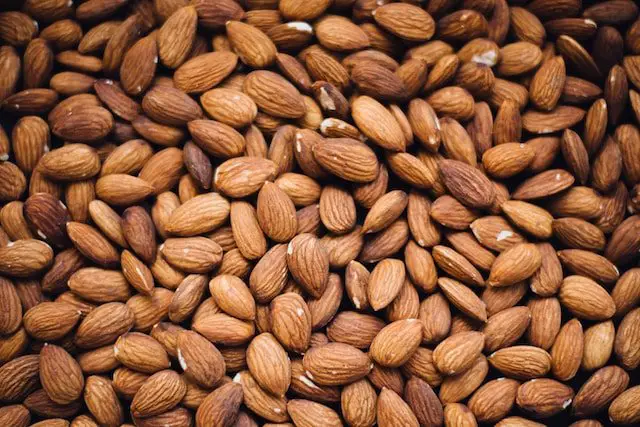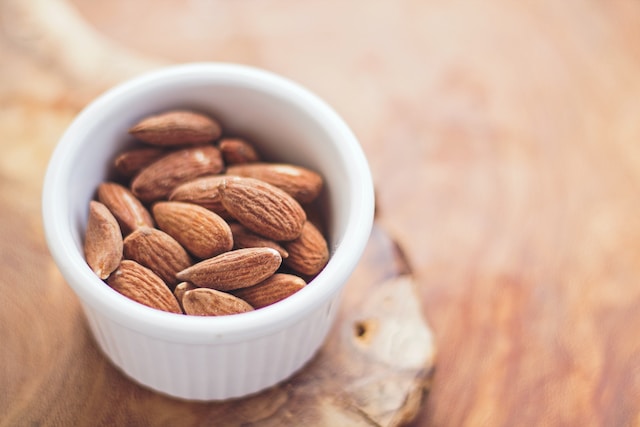Almonds are a nutritious and tasty snack that is enjoyed by people all over the world. They are a great source of protein, fiber, and healthy fats, making them a popular choice for those looking to maintain a healthy diet.
However, as with any food, it is possible to eat too many almonds, and this can have negative consequences for your health.
Contents
Weight Gain
One of the most significant risks associated with eating too many almonds is weight gain. Although almonds are packed with healthy nutrients, they are also high in calories, with one serving containing around 160 calories.
Eating too many almonds can cause you to consume more calories than your body needs, leading to an increase in body weight over time.
Digestive Issues
Another potential risk of eating too many almonds is digestive issues. Almonds are high in fiber, which can be beneficial for digestion in moderate amounts.
However, consuming excessive amounts of fiber can lead to gas, bloating, and even diarrhea in some cases. This is especially true if you are not used to consuming high amounts of fiber in your diet.
Might Lead To Mineral Deficiency
Eating too many almonds can also cause a buildup of phytic acid in your body. Phytic acid is a naturally occurring compound found in many nuts and seeds, including almonds.

It can bind to certain minerals, such as calcium, magnesium, and iron, and prevent their absorption by the body. This can lead to mineral deficiencies over time, which can have negative consequences for your health.
Allergic Reactions
It is also possible to develop an allergic reaction to almonds, especially if you consume them in large quantities. Symptoms of an almond allergy may include hives, swelling, difficulty breathing, and even anaphylaxis in severe cases.
If you have a known allergy to nuts, it is essential to avoid consuming almonds altogether, as even a small amount can trigger a severe reaction.
Eating too many almonds can lead to weight gain, digestive issues, mineral deficiencies, and even allergic reactions in some cases. As with any food, it is essential to listen to your body and consume almonds in amounts that are appropriate for your individual dietary needs and goals.
Can It Cause Overdose Of Vitamin E?
Almonds are a good source of vitamin E, a powerful antioxidant that helps protect cells from damage caused by free radicals. However, overeating almonds is not likely to cause a vitamin E overdose.
According to a renowned health institution, the recommended daily allowance (RDA) for adults for vitamin E is 15 milligrams (mg) per day. One ounce (28 grams) of almonds provides about 7.4 mg of vitamin E, which is almost half of the recommended daily amount.
While it is possible to consume more than the RDA of vitamin E through almonds or other sources, it is not likely to cause a vitamin E overdose unless you are consuming very high amounts of vitamin E supplements.
Taking high doses of vitamin E supplements can increase the risk of bleeding and may also interfere with the absorption of other vitamins and minerals. However, getting vitamin E from natural food sources like almonds is generally safe and beneficial for health.
Is There A Risk Of Developing Kidney Stones?
There is some evidence to suggest that overconsumption of almonds may increase the risk of developing kidney stones, especially in individuals who are prone to developing this condition.
Almonds are high in oxalates, which are naturally occurring compounds found in many foods, including nuts, seeds, and leafy greens. Oxalates can bind with calcium in the body and form crystals, which can then accumulate in the kidneys and form kidney stones.

While almonds are a healthy and nutritious food, consuming large amounts of almonds on a regular basis may increase the amount of oxalates in the body, potentially leading to an increased risk of kidney stone formation.
However, it is important to note that the evidence linking almonds to kidney stones is not conclusive, and more research is needed to fully understand this relationship.
Individuals who are at a higher risk of developing kidney stones, such as those with a history of kidney stones or a family history of the condition, may want to limit their intake of high-oxalate foods like almonds to reduce their risk.
It is also important to stay hydrated and maintain a balanced diet that includes a variety of fruits, vegetables, and whole grains to help prevent kidney stone formation.
Ideal Consumption & Nutritional Information
The ideal consumption of almonds can vary depending on your individual dietary needs and goals. According to a renowned heart health institution, a daily serving of nuts, including almonds, is about 1.5 ounces, which is equivalent to about 30-35 almonds.

Consuming this amount of almonds can provide a variety of health benefits without overdoing it on calories or other nutrients.
The following are some nutritional facts about almonds.
One serving of almonds, which is equal to about 1 ounce or 23 almonds, contains:
- Calories: 160
- Protein: 6 grams
- Fat: 14 grams (9 of which are healthy unsaturated fats)
- Fiber: 3 grams
- Carbohydrates: 6 grams
- Vitamin E: 37% of the recommended daily intake
- Magnesium: 20% of the recommended daily intake
- Riboflavin: 14% of the recommended daily intake
- Phosphorus: 13% of the recommended daily intake
- Calcium: 8% of the recommended daily intake
Almonds are also a good source of other essential nutrients, including iron, zinc, and potassium. They are naturally gluten-free and low in carbohydrates, making them a good option for those following a low-carb or gluten-free diet.
Conclusion
Almonds are a nutritious and healthy food that can provide a range of health benefits when consumed in moderation.
It’s important to listen to your body and consume all foods in moderation to avoid any negative health effects.
Incorporating a serving of almonds, such as 1.5 ounces or about 30-35 almonds per day, can be a good starting point for most people to enjoy the nutritional benefits of this delicious and versatile nut.
